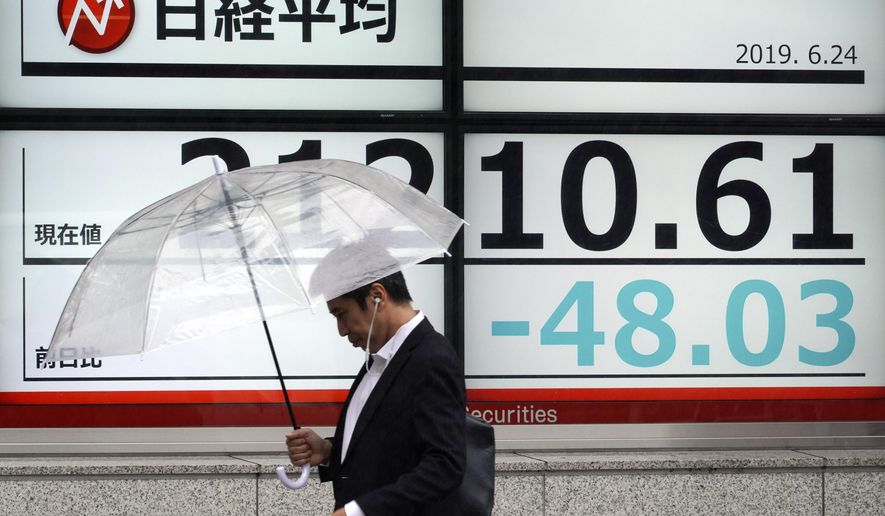BANGKOK (AP) - Global shares were mixed on Monday as investors watched for movement in the China-U.S. trade dispute ahead of a meeting between Presidents Donald Trump and Xi Jinping planned for this week in Osaka, Japan, at the Group of 20 summit.
Oil prices rose as uncertainties over U.S. tensions with Iran mounted, with Secretary of State Mike Pompeo saying he wants to build a global coalition against Tehran. That followed a week when Washington pulled back from the brink of a military strike on Iran.
Germany’s DAX slipped 0.6% to 12,263 after a closely-watched survey showed that German business confidence has fallen to a near five-year low. The CAC 40 in France lost almost 0.2% to 5,516 and London’s FTSE fell 0.1% to 7,403.
Wall Street looked poised to edge up, however, with the future contract for the Dow Jones Industrial Average picking up 0.2% to 26,739. That for the S&P 500 also gained 0.2%, to 2,955.
In Asia, the biggest uncertainty looming over the market was the U.S. trade war with China. Stocks mostly have rallied since Trump said he planned to meet with Xi, though Wall Street finished a milestone-setting week on a downbeat note on Friday as a late flurry of selling nudged stocks lower and snapped a four-day winning streak.
Japan’s Nikkei 225 index gained 0.1% to 21,285.99, while in Hong Kong the Hang Seng also added 0.1% to 28,513.00. The Kospi in South Korea edged less than 0.1% higher to 2,126.33. Australia’s S&P ASX 200 picked up 0.2% to 6,665.40 and the Shanghai Composite index added 0.2% to 3,008.15. Shares fell in Southeast Asia and Taiwan.
Potentially complicating the talks with Xi, on Friday, the U.S. announced it was blacklisting five Chinese organizations involved in supercomputing with military-related applications, citing national security as justification for denying its Asian geopolitical rival access to critical U.S. technology.
The five blacklisted organizations placed on the so-called Entity List include supercomputer maker Sugon, which is heavily dependent on U.S. suppliers including chipmakers Intel, Nvidia and Advanced Micro Devices.
The other four are the Wuxi Jiangnan Institute of Computing Technology and three Sugon affiliates. The Commerce Department called their activities “contrary to the national security and foreign policy interests of the United States.”
This latest move has left market sentiment in limbo, analysts said.
“The Trump administration’s further blacklisting of five Chinese tech companies ahead of the G-20 meeting had perhaps not been the best piece of news for markets with sentiment hinging on U.S.-China trade relations,” Jingyi Pan of IG said in a commentary.
“That said, neither had things taken any significant step for the worse within the market,” she said.
On Wall Street, even with the modest losses Friday the market delivered its third straight weekly gain.
The major U.S. stock indexes are up more than 7% so far this month and are holding on to gains of more than 14% for the year.
Investors have been reassured by statements from the Federal Reserve this month that suggest the central bank is prepared to cut interest rates in response to a slowing global economy. At the same time, traders remain concerned that corporate profits might suffer should the kind of economic slowdown that would prompt the Fed to cut rates take hold.
ENERGY: Benchmark crude oil picked up 41 cents to $57.84 per barrel in electronic trading on the New York Mercantile Exchange as tensions around Iran kept investors monitoring for any disruption to energy supplies. The contract rose 0.6% to settle at $57.43 a barrel on Friday, ending with a 9.2% gain for the week, the biggest weekly gain in more than two years. Only a few weeks ago, the price of U.S. crude was in a correction, what Wall Street calls a drop of at least 20% from a recent peak. Brent crude oil, the international standard, lost 79 cents to $64.41 per barrel.
CURRENCIES: The dollar fell slightly to 107.28 Japanese yen from 107.30 yen on Friday. The euro climbed to $1.1398 from $1.1371.




Please read our comment policy before commenting.